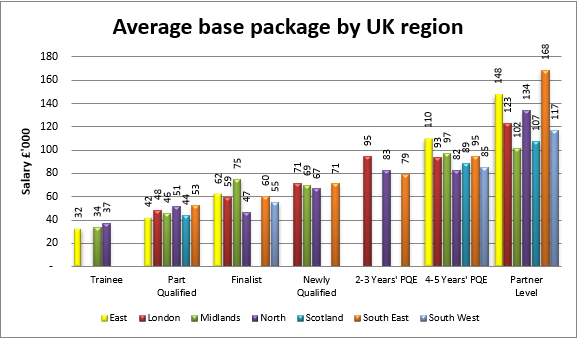In the patent profession, you could earn up to £45,000 before you’ve even finished your exams. Qualification increases your worth further and can be used as a passport to international opportunities. Fellows and Associates use the data from their annual salary survey to highlight what you could be earning from trainee to Partner level.
Being a patent attorney can be a very rewarding career and the salary increases can be frequent and significant as you progress through the examinations. In UK private practice, salaries are by and large linked to qualification status up until the point you have qualified. Although in some instances, there can be differences in starting salaries for different technical specialisms depending on supply and demand.
Average earnings
Patent attorneys do not move positions very frequently and salaries tend to increase in bursts. The market rate for a newly qualified attorney is around £70,000 but as you can see from the table below, salaries for attorneys who stay within the same firm can lag behind what they may be able to achieve on the open market. However, ‘newly qualified’ is to some extent ambiguous as some firms give a significant increase to their attorneys when they qualify in both Europe and the UK, whereas others do when they qualify in just one of the two jurisdictions.
Private practice vs. in-house
Typically, attorneys can earn more in-house than they can in private practice for the years following qualification up until Partner level. However, once attorneys reach Partner status within a private practice their earning potential, in general, far outstrips what can be achieved in the industry.
Salary by region
Contrary to popular belief, salaries outside of London are broadly the same as those within London. Certainly, being a patent attorney in another part of the UK would put you at no career disadvantage whatsoever compared to those based in London. In some cases, you may find the experience gained is more well-rounded during training as there may be more direct contact with clients from an early stage. Applying for positions in London is highly competitive and it does not always occur to applicants to consider regional offices. As a result, those looking to enter the profession can have a better chance of succeeding when applying to regional firms or firms with regional offices.
| Patent salaries by seniority | ||
| Level | In current firm* | When moving firms* |
| Trainee | £33,417 | £35,000-40,000 |
| Part qualified | £45,218 | £48,000-52,000 |
| Finalist | £53,567 | £55,000-60,000 |
| Newly qualified | £62,765 | £65,000-70,000 |
| 2-3 years post qualification | £85,377 | £82,000-90,000 |
| 4-5 years post qualification | £85,943 | £90,000-115,000 |
| Salaried partner level** | £121,638 | £125,000-150,000 |
*It is inevitable that one will achieve a higher salary when one moves firms, rather than receiving salary increases within a firm as the hiring company will seek to make the proposition of moving as attractive as possible.
** Equity Partners, i.e., those who own a share of the firm could earn salaries/profit shares running into hundreds of thousands of pounds.
Benefits
In addition to the base salary, patent attorneys often earn bonuses and receive other financial benefits to complete their remuneration package.
Patent attorney average percentage additional benefits add to base salary:
- Trainee – 9.1%
- Part Qualified – 13.3%
- Finalist – 35.8%
- Newly Qualified – 14.5%
- 2-3 Years Post-Qualified – 15.5%
- 4-5 Years Post-Qualified – 24.8%
- Partner/Partner Designate – 26.7%
Everyone now receives a pension by law but there are many other benefits available. The following are the most commonly received:
- Professional memberships paid for – 82.5%
- Flexible work location – 75.4%
- Private health/dental/eye care – 71.5%
- Training courses paid for – 71.5%
- Exams paid for – 64.0%
- Death in Service Benefit/Life Insurance – 61.8%
- Flexible working hours – 58.8%
Being a patent attorney can be very financially rewarding and the chances of reaching the higher salaries are very good in comparison with other professional services sector positions. There is excellent job security and more often than not, there are more open positions than there are people to fill them (although getting into the profession in the first place as a new trainee remains very challenging).
The above data has come from Fellows and Associates’ annual salary survey completed by those working in the profession and published in the summer of 2022. You can see the full survey and previous years’ results on the Fellows and Associates website.





